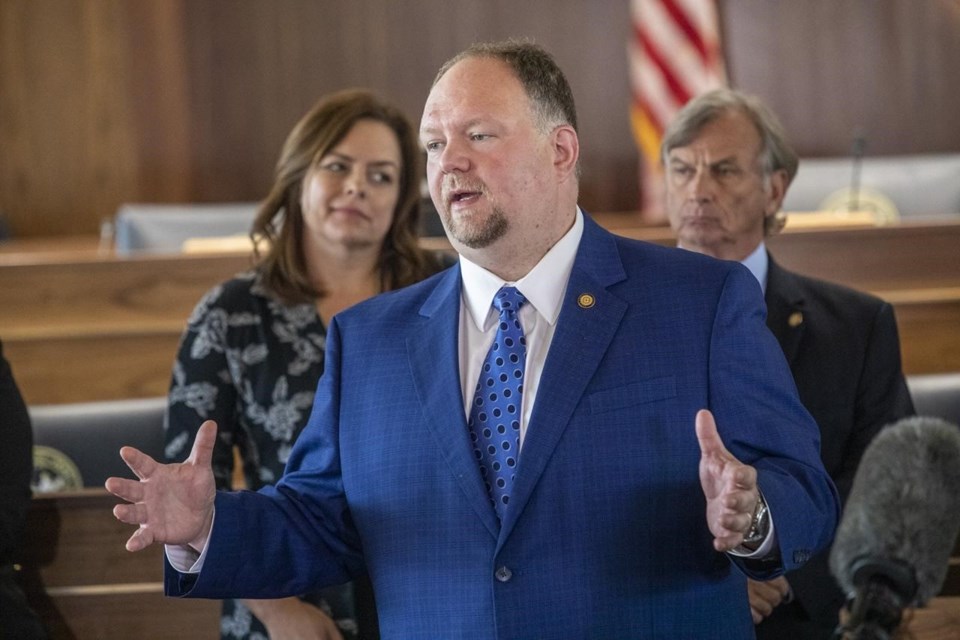RALEIGH, N.C. (AP) — North Carolina Republican lawmakers are preparing for extra time again in order to pass a state government budget and to reach other substantial policy agreements before adjourning for the summer.
While state law doesn't mandate when the General Assembly adjourns, legislative leaders had hoped to get a new budget enacted before the next fiscal year begins on July 1 and to send the remaining legislation to Democratic Gov. Roy Cooper's desk before July 4.
But top Republicans said this week that neither is likely to happen, citing protracted negotiations between the House and Senate over the two-year spending plan.
“The budget’s not done and there’s several decision points left to be made,” Sen. Ralph Hise, a Mitchell County Republican and one of the chamber's chief budget negotiators, said Thursday. “I think everyone here wishes it was moving faster and that we were voting that out.”
The General Assembly convened in January, and in the spring the House and Senate approved competing budget bills. While they were in agreement on bottom-line spending numbers — $29.8 billion for the next fiscal year and $30.9 billion for the year ending in June 2025 — they differed in the details in a host of areas.
The shape of a tax-reduction package remains a key sticking point, as well as how billions of dollars in proposed reserves will be distributed for items such as capital projects, economic development and emergency savings, Republican officials confirmed this week.
“There were some pretty big differences there,” House Speaker Tim Moore told reporters on Wednesday. “What I can tell you is that we are getting closer, but we still have a ways to go.” On taxes, the Senate budget went much farther to reduce individual income tax rates than the House's version.
The current fiscal year ends next Friday, but there's no threat of a government shutdown without a replacement budget because state law keeps agencies operating at base spending levels.
Hise and Moore said it was unlikely an agreement would be reached next week. Regardless, the chambers would have to vote again for the compromise and pass it along to Cooper, who would have 10 days to decide whether it should become law or be vetoed.
Even if the budget includes spending and policy provisions that Cooper detests, he'll face pressure to sign it.
A state law Cooper signed in March to expand Medicaid to hundreds of thousands of low-income adults requires enactment of a budget law before the state can formally accept and implement the coverage. Expansion has been among Cooper's top legislative priorities.
And should Cooper veto the budget bill presented to him, Republicans hold large enough majorities this year to override his vetoes if GOP legislators are all present and united.
After next week — in which lawmakers plan to consider overrides on other vetoed bills — legislators are planning to hold no votes around July 4, with a return to Raleigh the following week. Scheduling suggests they're prepared to continue to work into July.
Republicans still have several pending non-budget measures that have passed at least one chamber that will either clear the General Assembly or be set aside.
There are elections measures that make significant changes to early, in-person voting and traditional absentee ballots — and to how state and county election board members are chosen.
A measure to legalize medical marijuana that passed the Senate months ago sits in the House. Both chambers have advanced measures that would restrict access to gender-affirming health care for transgender youth. And the two chambers are negotiating competing measures to rework membership on several key state commissions controlled by Cooper’s appointees.
After an extended summer break, Republicans have envisioned returning to Raleigh in the early fall to redraw General Assembly and congressional districts before the 2024 election cycle formally begins.
Redistricting and budget stalemates with Cooper in 2019 and 2021 caused the legislature to work deep into the fall.
Gary D. Robertson, The Associated Press


